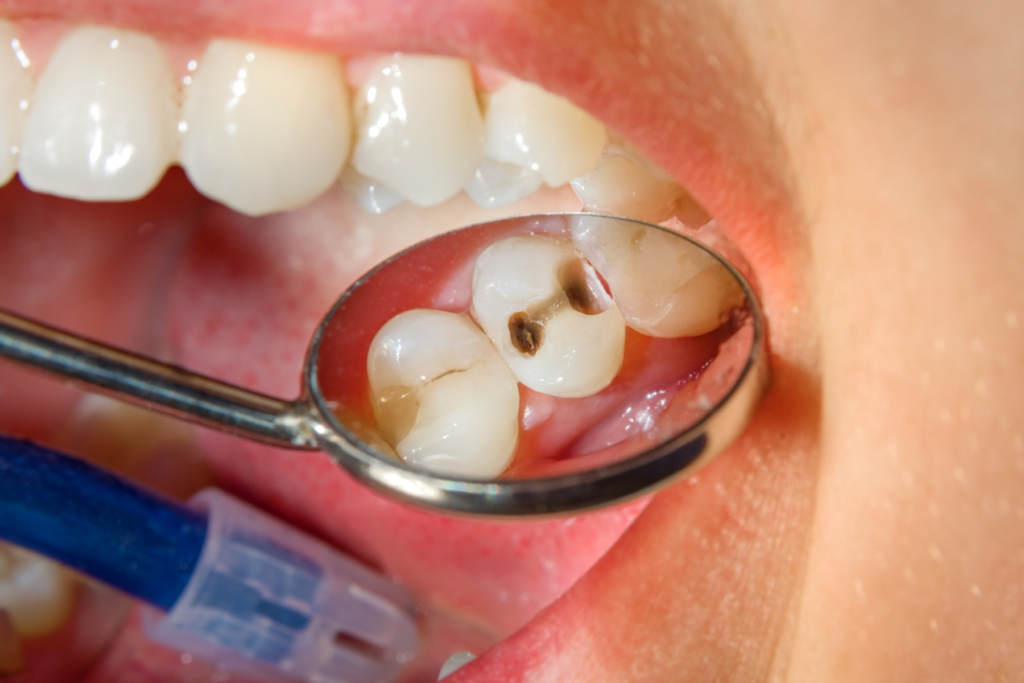Published on May 14, 2024

A throbbing wisdom tooth with a cavity can leave you wondering – should you fight for it or pull it?
Wisdom teeth, those mysterious back molars, often erupt late and can be tricky to clean, making them cavity magnets.
Now, faced with a cavity, you have the decision to make: treat the decay with a filling or extract the wisdom tooth altogether.
Cavities and wisdom tooth issues are common dental concerns that can significantly impact oral health. When faced with a cavity or a problematic wisdom tooth, patients often find themselves at a crossroads, unsure whether to undergo cavity treatment or opt for wisdom tooth extraction.
In this blog, we’ll delve into the considerations involved in determining whether to address a cavity through treatment or opt for the extraction of a troublesome wisdom tooth, enabling you to make the best decision for your oral health.
Learn about treatment procedures, consider the cost implications, and discover how to make an informed choice for a healthy smile.
Understanding Cavities
Cavities, also known as dental caries, are decayed areas on the teeth caused by bacterial activity. Bacteria in the mouth produce acids that erode tooth enamel, leading to cavities. These cavities can form on the surface of the teeth or in crevices, making them difficult to detect initially.
- Development: Cavities develop when food particles, especially sugars and starches, remain on the teeth. Bacteria feed on these particles, producing acids that gradually wear down the enamel.
- Symptoms: Early symptoms of cavities include tooth sensitivity to hot, cold, or sweet foods, visible pits or holes in the teeth, and occasional toothache. As cavities progress, pain becomes more frequent and intense.
- Consequences: Untreated cavities can lead to severe dental problems, including infections, abscesses, and tooth loss. They can also cause difficulty in eating and speaking and may contribute to overall health issues like heart disease and diabetes.

Wisdom Tooth Extraction
Wisdom teeth, or third molars, typically emerge in late adolescence or early adulthood, usually between the ages of 17 and 25. These teeth are located at the very back of the mouth, with two on the top and two on the bottom. Due to their position, wisdom teeth often cause issues, leading to the need for extraction.
Common Reasons for Extraction
Many people have insufficient space in their mouths for wisdom teeth to emerge properly. This can lead to impaction, where the teeth remain trapped beneath the gums or only partially emerge. Impacted wisdom teeth can cause pain, swelling, and infection. Additionally, wisdom teeth can grow at awkward angles, pressing against neighboring teeth and causing damage or misalignment.
When Extraction is Necessary?
Dentists recommend extraction when wisdom teeth cause or risk causing problems. Symptoms such as persistent pain, swelling, infection, and gum disease indicate the need for removal. Wisdom teeth that cause damage to adjacent teeth or create cysts and tumors also necessitate extraction. Even if wisdom teeth are asymptomatic, some dentists suggest proactive removal to prevent future issues, especially if X-rays show potential for problems.
Factors to Consider
Deciding between treating a cavity and extracting a wisdom tooth involves several factors. Understanding these considerations helps in making an informed choice that prioritizes oral health and comfort. Consulting with a dentist for personalized advice is crucial, as each case has unique aspects that influence the decision.
Severity of the Cavity: If the cavity is minor and confined to the enamel, a simple filling might suffice. However, extensive decay reaching the pulp may necessitate more complex treatments like root canal therapy.
Position and Health of the Wisdom Tooth: Impacted or partially erupted wisdom teeth often cause more problems than fully erupted ones. The likelihood of recurrent issues, such as infections or damage to adjacent teeth, might tilt the balance toward extraction.
Patient’s Age and Overall Health: Younger patients tend to recover more quickly from extractions, while older patients might face more complications. General health conditions, such as diabetes or immune disorders, also impact healing and may influence the treatment choice.
Symptom Severity and Frequency: Persistent pain, frequent infections, and other severe symptoms often necessitate prompt intervention. If a wisdom tooth causes chronic problems, extraction might be more beneficial than managing recurring issues.
Long-Term Prognosis: Dentists consider the long-term outlook for both cavity treatment and wisdom tooth retention. A tooth with a recurrent cavity might weaken over time, making extraction more viable. Conversely, preserving a tooth with a manageable cavity often improves overall dental health.
Financial Considerations: Cost can play a role in decision-making. While initial costs for fillings or extractions vary, the potential for future treatments and complications must be considered.
Decision-making Process
Making the decision between treating a cavity and extracting a wisdom tooth requires a thoughtful and informed approach. Evaluating various factors ensures that you make a choice that benefits your long-term oral health. Here are essential steps to consider:
Consult with Your Dentist: Schedule an appointment for a thorough examination. Your dentist will assess the severity of the cavity and the condition of the wisdom tooth, providing expert recommendations based on your specific situation.
Evaluate the Severity: Determine the extent of the cavity. Minor cavities may only require fillings, whereas severe decay might necessitate a root canal. For wisdom teeth, consider whether they are impacted, causing pain, or prone to infection.
Consider the Costs: Analyze the financial implications of each option. While fillings and extractions have upfront costs, consider potential future expenses for additional treatments or complications. Dental insurance coverage can also influence your decision.
Assess Recovery Time: Understand the recovery process for each procedure. Cavity treatment typically involves minimal downtime, while wisdom tooth extraction might require a longer recovery period, especially if complications arise.
Long-Term Oral Health Impact: Think about the future impact on your oral health. Preserving a healthy tooth is generally preferable, but recurrent issues with wisdom teeth may warrant extraction to prevent ongoing problems.
Personal Preferences and Lifestyle: Consider your personal comfort and lifestyle. If you prefer to avoid surgical procedures and can manage a cavity conservatively, that might be the best choice for you.
Deciding between treating a cavity and extracting a wisdom tooth requires careful consideration of various factors. Consult with your dentist to understand the severity, costs, recovery time, and long-term impact on your oral health. Making an informed decision ensures you maintain optimal dental health and avoid potential complications. Prioritize professional advice and your comfort to achieve the best outcome.
